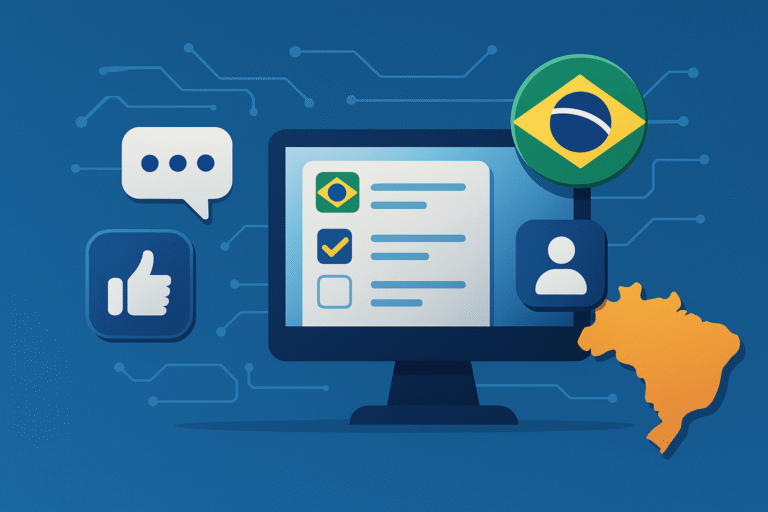
Introduction
Smart cities are not only models of technological innovation but also laboratories of digital democracy. Through participatory platforms, open data, and civic applications, they allow citizens to actively contribute to urban governance, increasing transparency, efficiency, and trust in institutions.
The link between smart cities and digital democracy is evident: digital infrastructures optimize services, while participatory tools empower citizens to shape collective decisions.
👉 For context, also see:
- What is digital democracy and why it matters today
- European policies for digital citizenship
- Estonia and online voting: a model to study
Smart City Tools for Digital Democracy
- Participation platforms for consultations and participatory budgeting.
- Open data portals to monitor spending and decision-making.
- Civic apps for reporting issues and co-designing urban policies.
- Digital identity and e-signatures to secure legal value in participation.
👉 Learn more: Digital ID and electronic signatures for participation
International Case Studies
Barcelona – Decidim and participatory budgeting
Barcelona has become a reference point in digital democracy. Its open-source platform Decidim allows citizens to propose, deliberate, and vote on projects, including participatory budgeting. Several urban and environmental proposals launched on Decidim have been implemented by the city council, strengthening trust between institutions and citizens.
👉 For a focus on the model, read: How Barcelona built a model of digital democracy
Barcelona – Connectem and digital inclusion
The Connectem Barcelona project mapped the digital divide and delivered connectivity, devices, and training to vulnerable groups. As a result, citizen participation in online consultations grew significantly among seniors and low-income families, proving that inclusivity is key to effective digital democracy.
Singapore – Smart Nation and Virtual Singapore
Singapore’s Smart Nation strategy integrates transport, civic apps, and e-services. The Virtual Singapore 3D digital twin supports traffic simulations, urban planning, and citizen consultations. The system reduced inefficiencies in transportation and increased the quality of feedback, though it also raised debates on privacy and data governance.
Italy – PRISMA Project (Sicily)
PRISMA created an interoperable cloud platform for municipalities like Catania and Siracusa, offering reusable APIs and modules. It increased the digital services available to citizens and improved interactions between local administrations and communities.
Tallinn – E-governance and digital participation
Tallinn (Estonia) integrates e-governance, digital ID, and online voting into everyday administration. Citizens can submit proposals, vote, and track decisions in real time. These practices reduced bureaucracy, cut waiting times, and strengthened public trust.
👉 See also: Estonia and online voting: a model to study
Benefits and Challenges
Benefits
- Inclusion: digital access reduces geographical barriers.
- Transparency: open data and traceable processes.
- Efficiency: reduced costs and shorter timelines for consultations.
- Civic innovation: collaborative design of urban solutions.
Challenges
- Privacy: concerns about surveillance and data use.
- Digital divide: exclusion without policies on access and training.
- Legitimacy: processes gain credibility only if results are visible and acted upon.
👉 Read also: 10 best practices for inclusive participatory processes
Cost Comparison and Savings
Digital processes not only increase participation but also deliver significant economic benefits compared to traditional participation.
Traditional costs
- A medium-scale citizens’ assembly (100–150 participants) can cost €50,000–150,000.
- National deliberations (conventions, juries) often exceed €2–3 million.
Digital costs
- Launching Decidim costs around €30,000–80,000, with annual maintenance of €10,000–15,000.
- Cloud platforms like PRISMA cut service costs by 25–30% via shared infrastructure.
Observed savings
- Barcelona: reduced consultation costs by up to 40%.
- Singapore: smart applications reduced urban operating costs by about 20%.
- Tallinn: e-governance produced structural savings estimated at around 2% of GDP.
Participation efficiency
- Online consultations reach new groups: in Barcelona, over 60% of participants were first-timers.
- Process timelines shortened from 6–12 months to 2–3 months thanks to digital tools.
Conclusion
The international experiences of Barcelona, Singapore, Tallinn, and Italy show that digital democracy in smart cities is not just a vision, but a reality. When proposals are implemented and results are measured in terms of cost-efficiency and citizen satisfaction, trust in institutions grows.
The future of smart cities depends on balancing innovation, inclusion, and transparency. Only then can we create cities that are not just smart, but truly democratic.
External Sources
- Decidim – Barcelona Digital Democracy
- Smart Nation Singapore – Virtual Singapore
- PRISMA Project (arXiv)
- European Data Portal
- OECD – Innovative Citizen Participation


